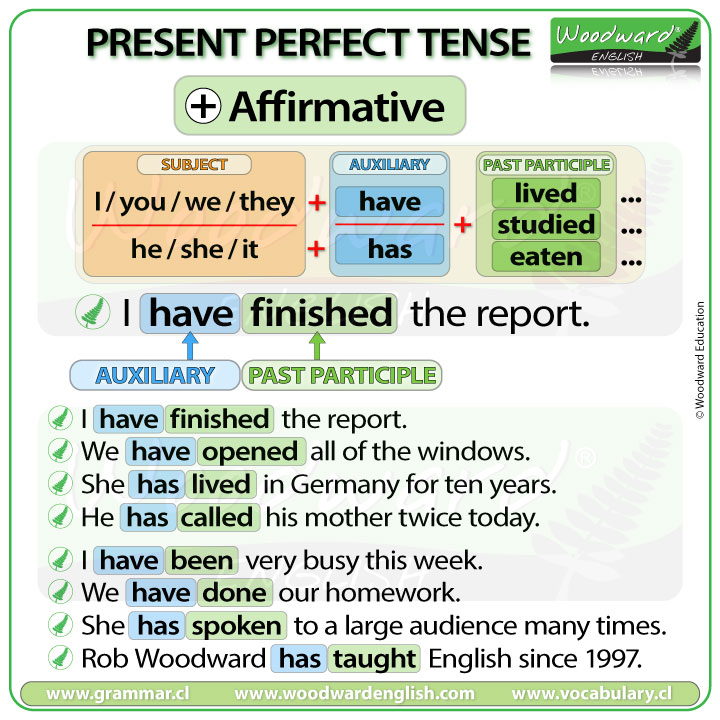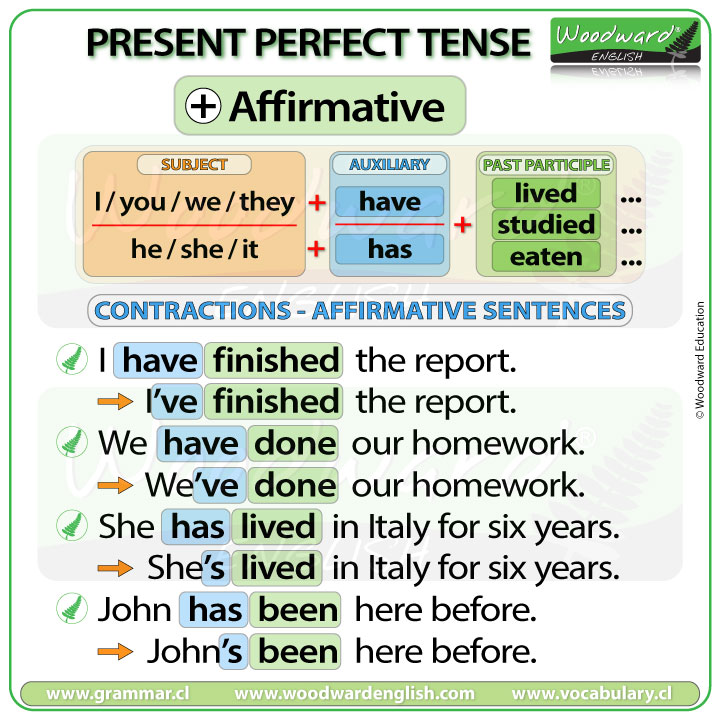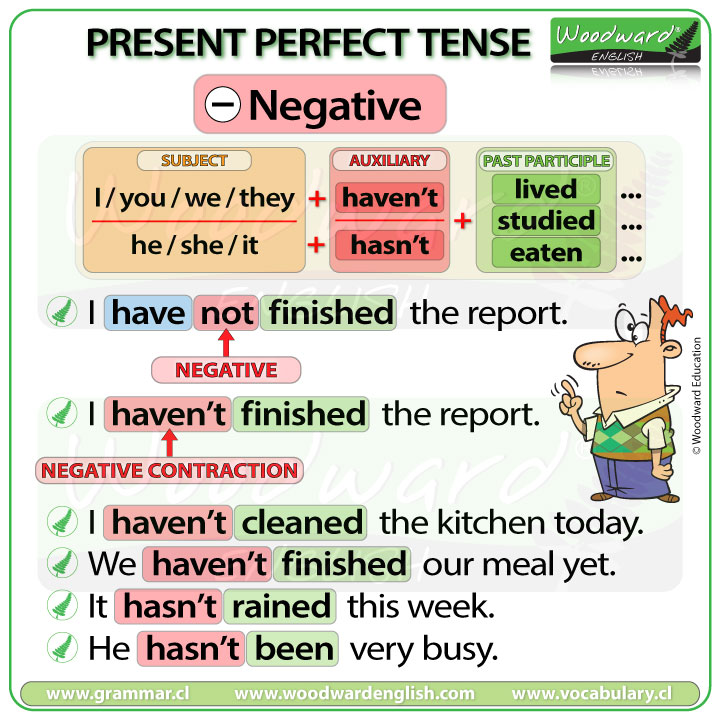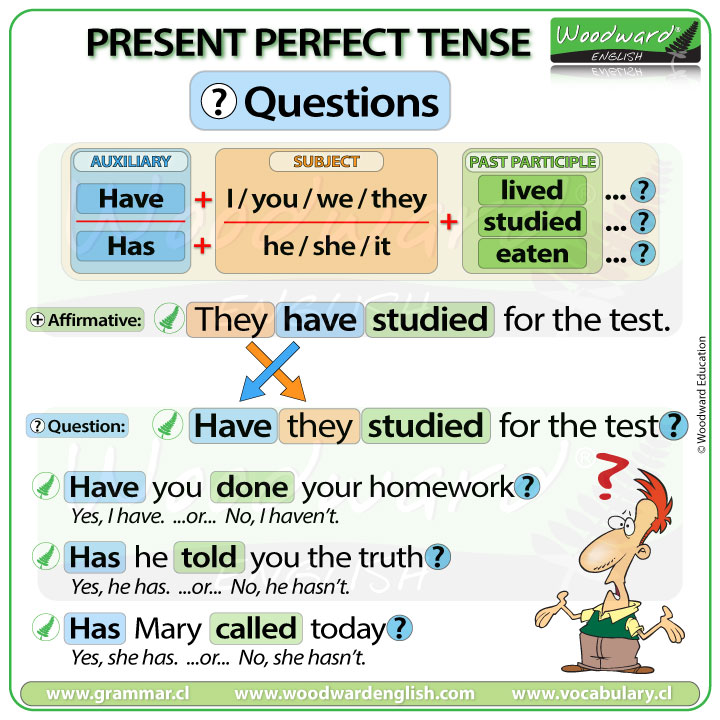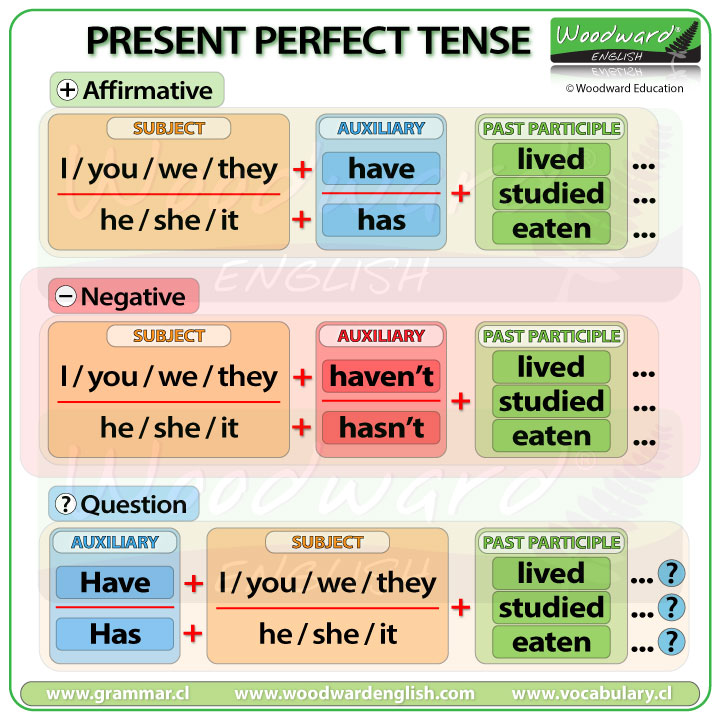Вы когда-нибудь прыгали с парашютом? Если пиццу? Перебегали дорогу на красный свет? Просили преподавателя поставить вам зачет просто так?
Если вы ответили «да» хотя бы на один из этих вопросов, то эта статья — для вас. Ведь у вас есть жизненный опыт, а для его описания нам просто необходимо время Present Perfect.
А если вы не увлекаетесь экстремальными видами спорта, придерживаетесь безглютеновой диеты, вы ответственный пешеход и такой же студент… вам все равно жизненно необходимо ориентироваться в этой части грамматики. Ну, хотя бы для того, чтобы задавать людям вопросы. Но, обо всем по порядку.
Вопросы в Present Perfect
В рамках Present Perfect вопросительные предложения могут быть общими, то есть, требующими ответа «да» или «нет», и или специальными, начинающимися с вопросительных слов. Еще их называют Wh questions.
Present Perfect questions — общие и специальные вопросы
Общие вопросы (yes/no questions):
Have you been to Paris? — Вы были в Париже? Have you eaten pizza in Italy? — Вы ели пиццу в Италии?
Специальные вопросы (wh-questions):
Как видите, неотъемлемая часть структуры вопроса в Present Perfect — это глагол «have». Здесь он играет функциональную роль, то есть, теряет свое лексическое значение. Это значит, что не нужно переводить его, как «иметь». Он в данном случае служит только для формирования грамматического времени. Не забудьте, что в третьем лице единственного числа have меняется на has.
Следующая составляющая — подлежащее. Оно может иметь вид как существительного, так и местоимения, например, в таблице выше мы использовали местоимение «you» (вы).
И, наконец, причастие прошедшего времени, или Past Participle. Если глагол правильный, то для образования этой формы причастия добавляется окончание -ed. Eсли же глагол неправильный, используется его третья форма.
Схема общего вопроса выглядит так:
have/has — подлежащее — V+ed/V3
Для специальных вопросов, соответственно:
Wh question — have/has — подлежащее — V+ed/V3
В утвердительном предложении, в отличии от вопросительного, нет инверсии, т.е., на первом месте подлежащее:
I have been to Paris — Я был в Париже
You have eaten pizza in Italy — Ты ел пиццу в Италии
В отрицании к глаголу «have» присоединяется частица «not». Чаще всего эта формула встречается в сокращенном виде: haven’t
I haven’t been to Paris — Я не был в Париже
I haven’t eaten pizza in Italy — Я не ел пиццу в Италии
Сейчас, когда вы поняли, как строятся такие предложения, ознакомьтесь с примерами из таблицы, обращая внимание на их структуру:
Презент Перфект: утверждение, отрицание, вопрос
Наречия времени
Present Perfect часто сопровождается наречиями, выражающими время и частоту действий, такими, как:
ever — когда-либо
already — уже
before — до этого
lately — недавно и т.д.
yet — еще
Это — своеобразные маркеры, по которым можно узнать, что речь идет о настоящем совершенном времени:
Have you ever tried dark chocolate? — Вы когда-нибудь пробовали темный шоколад?
Have we met before? — Мы встречались раньше?
Haven’t I seen you lately? — Я тебя не видел в последнее время?
Наречие YET показывает, что что-то ожидаемое не случилось до определенного времени. Оно ставится в конец предложения.
— Have you fixed the computer yet? — Ты еще не починил машину?
— Have you replied to her message yet? — Ты еще не ответил на ее сообщение?
ALREADY берем, когда что-то случилось раньше, чем предполагалось. Положение «already» практически всегда — в середине предложения, перед Past Participle.
Have you already fixed the computer? — Ты уже починил компьютер?
Have you already replied to her message? — Ты уже ответил на ее сообщение?
Как задаются в Present Perfect вопросы — теперь понятно. А как на них отвечать?
Все должно быть симметрично: если в вопросе прозвучал вспомогательный глагол have, то и в ответе он должен присутствовать.
— Have you ever run a marathon?
— Yes, I have
— Вы когда-нибудь пробегали марафон?
— Да, пробегал
— Have you ever run across the street?
— No, I haven’t
— Вы когда-нибудь перебегали дорогу?
— Нет
— Have we met before?
— Yes, I think we have
— Мы раньше встречались?
— Да, думаю, да
Есть варианты и более коротких ответов:
— Have you already fixed the computer?
— Not yet
— Ты уже починил компьютер?
— Нет еще
Итак, со структурой вопросов и ответов разобрались. Теперь самое интересное:
Когда и зачем задаются вопросы в Презент Перфект?
Чаще всего это время употребляется в разговорной речи. Именно в живой языковой среде можно услышать что-то вроде:
Hey, I haven’t seen you for a while! How have you been?
(Привет, давно тебя не видно! Как ты?)
Давайте посмотрим, какие бывают вопросы, в зависимости от ситуации:
- Вопросы о жизненном опыте, результатах, достижениях людей
— Have you ever eaten frog legs? — Ты когда-нибудь ела лягушачьи лапки?
— Have you ever travelled by plane? — Ты когда-нибудь летал на самолете?
— Has your grandmother ever used a computer? — Твоя бабушка когда-нибудь пользовалась компьютером?
В русском языке нет специального грамматического времени, чтобы выразить идею таких предложений. Мы пользуемся вспомогательными словами, типа «когда-нибудь», «в жизни», «вообще».
- Разговоры о процессах, начавшихся в прошлом и длящихся до сих пор
— How long have you been married? — Как долго вы женаты?
— Why have you been upset these days? — Почему ты расстроен в последнее время?
— How long have you already been here? — Давно вы уже здесь находитесь?
Заметьте, что в русском переводе употребляется настоящее время. Несмотря на причастие прошедшего времени, которое содержат такие вопросы, Present Perfect — это настоящее совершенное время. Оно описывает состояние вещей на данный момент, хотя действие и началось когда-то в прошлом.
- Вопросы о событиях, произошедших только что
Допустим, вы находитесь на вечеринке, и ваша спутница минут десять назад отправилась за коктейлем, да так и не вернулась. Вы не можете ее найти, немного нервничаете и спрашиваете окружающих:
— Has anyone seen Masha? — Кто-нибудь видел Машу?
— Have you seen a girl in a red dress? — Видел кто-нибудь девушку в красном платье?
Когда вы, наконец, нашли Машу, вы можете спросить ее:
— Masha, where have you been? — Маша, где ты была?
А она может ответить:
— I’ve been here watching you — Я была здесь, смотрела на тебя
- Вопросы-рекомендации
Задавая такой вопрос в Презент Перфект, вы как бы выступаете в роли эксперта и советчика. По форме это yes/no questions, но цель в данном случае — не получить немедленный ответ, а подтолкнуть собеседника к размышлениям.
— You’re good at languages. Have you ever considered becoming an English teacher?
— У тебя хорошо с языками. Никогда не думала стать учителем английского?
— Have you ever thought about telling him everything?
— Не думал рассказать ему всю правду?
В таком виде вопросов после Past Participle следует форма глагола с окончанием -ing.
- Вводная часть к условным предложениям. — Have you ever wondered what would happen if tigers went extinct?
— Вы когда-нибудь задумывались, что было бы, если бы тигры вымерли?— Have you imagined what would happen if there were no universities?
— Вы представляли, что могло бы быть, если бы не было университетов?
Когда нужно употреблять Present Perfect, a когда Past Simple?
Нужно понимать, что Past Simple описывает исключительно завершенные действия из прошлого, при этом известно, когда совершались эти действия.
I graduated from university in 2011
Я окончил университет в 2011 году
Говорящий хотел упомянуть год, в котором он закончил учебное заведение, поэтому выбрал Past Simple.
В Present Perfect вопрос, когда совершилось действие, не стоит. Важно, что это событие вообще произошло.
I have graduated from university. What should I do next?
Я окончил университет. Что мне теперь делать?
Соответственно, не нужно задавать вопрос в Present Perfect, если вы хотите узнать, когда было совершено действие. Для этого стоит воспользоваться Past Simple:
When did you graduate from university?
Когда ты закончил университет?
Если же вам важен сам факт наличия результата (в данном случае, диплома о высшем образовании), можно смело спрашивать в Present Perfect:
Have you graduated from university?
Ты закончил университет?
Резюмируя все вышесказанное, Present Perfect пригодится, если мы задаем вопрос о:
- недавних событиях,
- событиях, начавшихся в прошлом и длящихся до сих пор,
- результатах и опыте других людей.
Affirmative Sentences
- I have finished the report.
This is a sentence in the present perfect tense.
We know it is in the present perfect tense because it has the auxiliary verb HAVE (or HAS) followed by a PAST PARTICIPLE.
Look at the structure for affirmative sentences in the present perfect tense. The word order is:
subject + have / has + past participle
Past Participles
The past participle can be regular or irregular.
Let’s look at the present perfect tense with regular past participles.
Regular past participles end in ED.
Some example sentences:
- I have finished the report.
- We have opened all of the windows.
- She has lived in Germany for ten years.
- He has called his mother twice today.
Notice how the past participle of these regular verbs is the same as the past simple tense form.
But some past participles are IRREGULAR. For example:
- I have been very busy this week.
(Been is the past participle of TO BE) - We have done our homework.
(Done is the past participle of TO DO) - She has spoken to a large audience many times.
(Spoken is the past participle of TO SPEAK) - Rob Woodward has taught English since 1997.
(Taught is the past participle of TO TEACH)
Notice how the past participle of these irregular verbs is different from their past tense form.
I recommend our lesson about 101 Irregular Past Participles with example sentences in English.
Present Perfect Tense Contractions – Affirmative Sentences
In spoken English, we almost always use contractions with the present perfect tense. We contract the subject and the auxiliary have / has.
For example: I have
We contract the subject I with the auxiliary HAVE which becomes I’VE … and then you can add the past participle.
Here is the list of present perfect tense contractions:
- I have ➡️ I’ve
- You have ➡️ You’ve
- He has ➡️ He’s
- She has ➡️ She’s
- It has ➡️ It’s
- We have ➡️ We’ve
- They have ➡️ They’ve
Let’s look at some example sentences.
Can you change these present perfect sentences to contain a contraction?
- I have finished the report.
- We have done our homework.
- She has lived in Italy for six years.
- John has been here before.
Here are the answers:
- I have finished the report. ➡️ I’ve finished the report.
- We have done our homework. ➡️ We’ve done our homework.
- She has lived in Italy for six years. ➡️ She’s lived in Italy for six years.
- John has been here before. ➡️ John’s been here before.
Now, let’s look at how to make negative sentences in the present perfect tense.
Present Perfect Tense – Negative sentences
Look at this affirmative sentence:
- I have finished the report.
There is the auxiliary HAVE and the past participle FINISHED.
How can we make this negative?
To create a negative sentence in the present perfect tense, we just add NOT between the auxiliary HAVE or HAS and the past participle.
- I have finished the report. (This is an affirmative sentence)
- I have not finished the report. (This is a negative sentence)
However, it is much more common to use a contraction in negative sentences.
You will normally hear:
- I haven’t finished the report.
Look at this affirmative sentence:
- She has seen the movie.
How can we make this negative?
To create a negative sentence in the present perfect tense, we just add NOT between the auxiliary HAVE or HAS and the past participle.
- She has seen the movie. (This is an affirmative sentence)
- She has not seen the movie (This is a negative sentence)
However, it is much more common to use a contraction in negative sentences.
You will normally hear:
- She hasn’t seen the movie.
Let’s look at some more examples of negative sentences in the present perfect tense:
- I haven’t cleaned the kitchen today.
- We haven’t finished our meal yet.
- It hasn’t rained this week.
- He hasn’t seen the movie.
Here is the summary chart to make negatives sentences in the present perfect tense.
We have the subject + negative auxiliary (haven’t/hasn’t) + past participle
Present Perfect Tense – Questions
Look at this affirmative sentence:
- They have studied for the test.
It has the subject THEY, the auxiliary HAVE and the past participle STUDIED.
How can we change this into a question?
To make a question in the present perfect tense, we change the order of the subject with HAVE / HAS.
- They have studied for the test. … becomes …
- Have they studied for the test?
Look at this affirmative sentence:
- She has arrived early.
How can we make this a question? We change the order of the subject and the auxiliary. The question becomes…
- Has she arrived early?
Let’s look at some more examples of present perfect questions:
- Have you taken your medicine today?
- Have we finished for the day?
- Has the game started?
- Has she read the report? (Remember READ is the past participle of READ – yes, they have the same spelling but the pronunciation is different)
Present Perfect Tense – Short Answers
We can also give short answers to present perfect tense questions.
Look at these questions:
- Have you done your homework?
- Has he told the truth?
- Has Mary called today?
Obviously, you can reply with just YES or NO, but in reality, we almost always give a short answer.
Present perfect short answers use HAVE or HAVEN’T in them.
Let’s look at the first question:
- Have you done your homework?
Since this question is HAVE YOU…?
The short answers would be: Yes, I have. … or … No I haven’t.
- Have you done your homework? Yes, I have. … or … No, I haven’t.
What would the short answers be for the next two questions?
- Has he told the truth?
- Has Mary called today?
You could say:
- Has he told the truth? Yes, he has. … or … No, he hasn’t.
- Has Mary called today? Yes, she has. … or … No, she hasn’t.
Present Perfect Tense with Questions Words
We can also use question words (what, where, why, etc.) at the beginning of the question. For example:
- What have you done?
- Where has he gone?
- Why have they stopped?
- How has she felt today?
Present Perfect Tense Summary Chart
In the next lesson we are going to look at WHEN to use the present perfect tense in English.
I hope you found this lesson about the present perfect tense useful.
If you did, please let other people know about it.
1. Questions without question words in the Present Perfect
| Auxiliary | Subject | Verb | Rest | Yes/No | Subject | Auxiliary (+ n’t) |
|---|---|---|---|---|---|---|
| Have | you | done | the shopping? | Yes, No, No, |
I I I |
have. have not. haven’t. |
| Has | Jane | played | basketball? | Yes, No, No, |
she she she |
has. has not. hasn’t. |
| Have | they | been | to Canada? | Yes, No, No, |
they they they |
have. have not. haven’t. |
2. Questions with question words in the Present Perfect
| Question word | Auxiliary | Subject | Verb | Rest | Answer |
|---|---|---|---|---|---|
| How often | have | you | tried | to download the file? | I have tried to download the file three times. |
| How long | have | they | lived | in Ottawa? | They have lived in Ottawa since 2009. |
| Where | has | he | been? | He has been at home. |
► Use has with the 3rd person singular (he, she, it) and in all other persons have.
Use the verb in the past participle:
- regular verbs: infinitive + -ed
- irregular verbs: 3rd column of the table of the irregular verbs
Хорошее понимание темы Present Perfect дают наглядные примеры вопросительных предложений в этом времени.
Как задать вопрос в Present Perfect — примеры с переводом
Have you ever eaten frog? Ты когда-нибудь ел лягушек?
Have you ever eaten snails? Ты когда-нибудь ела улиток?
Have they ever eaten snake? Они когда-нибудь ели змею?
How long have they been live together? Давно они живут вместе?
Have you discussed this with your parents? Ты обсуждала этот с родителями?
Have you thought about your future? Ты думал о своем будущем?
Have you thought of moving to Canada? Ты не думал о том, чтобы переехать в Канаду?
Have you considered looking for a new job? Ты не думал поискать новую работу?
Have you been to the US before? Ты был когда-нибудь в США?
Has anyone seen Alex? Кто нибудь видел Алекса?
Has anyone seen my keys? Кто нибудь видел мои ключи?
Have we met before? Мы встречались раньше?
Have you talked to your mom recently? Ты разговаривала со своей мамой?
Have you finished watching ‘Game of Thrones’ yet? Ты закончил смотреть «Игру престолов»?
Have you started your project? Ты начал свой проект?
Have you done your homework yet? Ты уже сделал уроки?
Where have you been? Где ты был?
How have you been? I’ve been busy. I’ve been good.
What have you done? Что ты сделал?
When has that ever happened? И когда же это произошло?
How long have you been there? Как долго ты там был?
Why has no one told me this before? Почему никто не сказал мне об этом?
You’ve never ridden a motorcycle? Ты никогда не ездил на мотоцикле?
Have you seen my phone? I left it in the bathroom. Have you seen it?
Ты не видел мой телефон? Я оставила его в ванной. Видел?
Has he taken out the trash? Ты вынес мусор?
Which countries have you been to? В каких странах ты была?
Have you ever seen the movie Titanic? Ты видела «Титаник»?
Have you ever seen the TV series, «Doctor House»? Ты видел сериал «Доктор Хауз»?
Have you ever broken a bone? У тебя когда-нибудь был перелом кости?
Have you ever seen a ghost? Ты видел когда-нибудь привидение?
Have you seen this movie? Ты видела этот фильм?
Have you washed your car? Ты помыл машину?
Have you done the shopping? Ты всё купила?
Have you lost your bag? Ты потеряла сумку?
Have they stolen my car? Они угнали мою машину?
Have you ever imagined a future with me? Ты когда-нибудь думал о будущем со мной?
Have you ever climbed a mountain? Ты когда нибудь поднимался в горы?
Has he passed his driving test? Он сдал экзамен по вождению?
Have you ever received a speeding ticket?
Тебе когда-нибудь выписывали штраф за превышение скорости?
Table Of Contents:
- Negative sentences
- Questions in Present Perfect
- Yes/No questions
- Special questions
We use the Present Perfect to talk about actions or events in the past that still have an effect on the present moment. The focus is on the result.
Negative sentences
To talk about actions that haven’t happened in recent past, we use negative sentences in Present Perfect.
To make negative statements in the Present Perfect, we use:
have / has + not + Past Participle
| Singular | Plural |
| I have not (haven’t) visited You haven’t visited He/she/it hasn’t visited |
We haven’t visited You haven’t visited They haven’t visited |
We often use ‘yet‘ in negative Present Perfect sentences.
- Jim hasn’tphoned me yet. I’ve been waiting since morning.
- I’m not ready to go. I haven’t had a shower yet.
- They haven’t danced together for 2 years.
We use Present Perfect tense to ask and answer questions about actions or events in the past that still have an effect on the present moment.
To make questions in the Present Perfect, we should use the following structure:
have / has + subject + Past Participle
- Have you lived here all your life?
- Have you met Ted?
Yes/No questions
To create a question that will be answered with a ‘yes’ or ‘no’, use ‘has‘ / ‘have‘ (or ‘hasn’t‘ / ‘haven’t‘ for a negative question) + Past Participle form of the verb.
| Singular | Plural |
| Have I visited? Have you visited? Has he/she/it visited? |
Has we visited? Have you visited? Have they visited? |
- Has she seen the latest James Bond movie?
- It’s 11 o’clock already. Have you cleaned up your bedroom?
- Have you been in France? No, I haven’t.
Note: In short positive answers to the Present Perfect questions we use only full forms of ‘have’/’has’. In short negative answers we can also use short forms.
- Have you read this book?
- Yes, I have (No, I haven’t).
- Has he ever played golf?
- Yes, he has (No, he hasn’t).
We often use the adverb ‘ever‘ when asking questions about events in people’s lives. In such questions we put ‘ever‘ before the past participle:
- Have you ever been to Australia?
- Has she ever tried your cooking?
- Have they ever met each other?
We often use the adverb ‘yet‘ when asking questions about actions or events that could have just happened:
- Have you seen Mary yet?
- Have you eaten all apples yet?
Special questions
Special questions (also known as wh-questions) are questions that require more information in their answers. They are made using wh- words such as what, where, when, why, which, who, how, how many, how much.
To make a special question, use the same word order as with yes-no questions but put a wh-word before the verb ‘have’ or ‘has’. The structure is:
wh-word + have / has + [subject] + Past Participle
- What famous people have you seen?
- What languages has he studied?
- How much money has she spent today?
Use ‘How long…?’ to ask for how much time a situation has continued:
- How long has she lived in Rotterdam? – She has lived in Rotterdam for six years.
See also:
Present Perfect: Statements
Present Perfect for Unfinished Past
Present Perfect with ‘Just’ and ‘Yet’
Present Perfect for Experience


